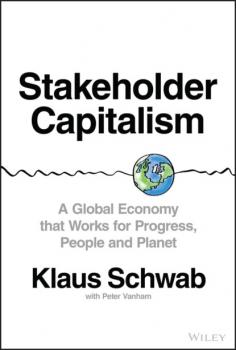Экономика
Различные книги в жанре ЭкономикаCorporate Innovation Strategies
Corporate social responsibility (CSR) is simply the maximization of a company's value over time, undertaken because, in the long run, social and environmental problems ultimately become financial problems. The justification for CSR is therefore associated with representing the nature and role of the company, as well as its purpose. Companies therefore regard CSR as a strategic investment that is part of a proactive, resilient, inclusive approach, based on the creation of shared value. This approach is capable of reducing negative societal impacts of their activities, or inducing positive impacts if they sustain a hybrid culture, all the while improving their competitive advantage. This book presents a theoretical development that analyzes the challenges of CSR strategies based on the creation of shared value. Two case studies are presented, analyzing the different forms of social innovation strategies capable of inducing this shared value creation.
Entrepreneurship and Innovation Education
This book is a compilation of tools, techniques and frameworks for use in the field of entrepreneurship and innovation (E&I) education. Developed and honed over the past two decades, these teaching approaches are combined with well-versed practical insight. As professors know all too well, the human brain cannot articulate more than three or four dimensions of a problem without the aid of what could be referred to as checklists for thinking: frameworks (visual or otherwise) that help students think in terms of multiple variables affecting a problem. Entrepreneurship and Innovation Education provides a toolbox of more than 50 frameworks for analyzing entrepreneurship and innovation problems, and for enabling effective decision-making. It is a useful guide for professors and students alike who are looking for an overview of available tools, methods and approaches to actively learn how to go from the visionary idea to the market.
Wertschätzende Organisationsentwicklung
In ihrem Buch beschreiben die Autoren die Grundlagen von Organisationsentwicklungsprozessen und Gestaltungsmöglichkeiten. <br> Methodisch basiert das Buch auf dem «Appreciative Inquiry» Ansatz für wertschätzende Organisationsentwicklung. Die angebotenen Werkzeuge zielen auf Lösungsfokussierung und Ressourcenaktivierung bei gleichzeitiger Wertschätzung dessen, was gut funktioniert.<br> Im Buch beschreiben die Autoren zunächst die Grundlagen der Organisationsentwicklung, indem sie wichtige Begriffe kurz erläutern und visualisieren. Außerdem finden sich einige Storytelling-Elemente zur Vermittlung der Inhalte und einen ausgeprägten Serviceteil mit Stimmen aus der Praxis. Weitergehend bringen die vier Autoren, ihre eigene angewandte Erfahrung aus verschiedenen Organisationsentwicklungsprojekten mit ein. <br> Die Organisationsentwicklungsmethode «Appreciative Inquiry (AI)» bzw. Wertschätzende Erkundung ist ein positiver Ansatz für Transformationsprozesse. Er verändert die Blickweise von der Herausforderung oder Problemsituation auf die Lösungsfokussierung und Ressourcenaktivierung. Der 5D-Zyklus von «Appreciative Inquiry» (Define, Discover, Dream, Design, Deliver) gibt die Struktur für die Werkzeuge, die in diesem Buch vorgestellt werden, vor. Für jede der fünf Prozessphasen stellen die vier Autoren ihre erprobten Lieblingstools vor. Sie bieten dem Anwender einen schnellen und unmittelbaren Einstieg in die praktische Umsetzung.<br> Im abschließenden Kapitel bieten die Autoren die Herangehensweisen und Lösungsansätze für verschiedene Anlässe von Organisationsentwicklungsprojekten.<br> <br>
Stakeholder Capitalism
Reimagining our global economy so it becomes more sustainable and prosperous for all Our global economic system is broken. But we can replace the current picture of global upheaval, unsustainability, and uncertainty with one of an economy that works for all people, and the planet. First, we must eliminate rising income inequality within societies where productivity and wage growth has slowed. Second, we must reduce the dampening effect of monopoly market power wielded by large corporations on innovation and productivity gains. And finally, the short-sighted exploitation of natural resources that is corroding the environment and affecting the lives of many for the worse must end. The debate over the causes of the broken economy—laissez-faire government, poorly managed globalization, the rise of technology in favor of the few, or yet another reason—is wide open. Stakeholder Capitalism: A Global Economy that Works for Progress, People and Planet argues convincingly that if we don't start with recognizing the true shape of our problems, our current system will continue to fail us. To help us see our challenges more clearly, Schwab—the Founder and Executive Chairman of the World Economic Forum—looks for the real causes of our system's shortcomings, and for solutions in best practices from around the world in places as diverse as China, Denmark, Ethiopia, Germany, Indonesia, New Zealand, and Singapore. And in doing so, Schwab finds emerging examples of new ways of doing things that provide grounds for hope, including: Individual agency: how countries and policies can make a difference against large external forces A clearly defined social contract: agreement on shared values and goals allows government, business, and individuals to produce the most optimal outcomes Planning for future generations: short-sighted presentism harms our shared future, and that of those yet to be born Better measures of economic success: move beyond a myopic focus on GDP to more complete, human-scaled measures of societal flourishing By accurately describing our real situation, Stakeholder Capitalism is able to pinpoint achievable ways to deal with our problems. Chapter by chapter, Professor Schwab shows us that there are ways for everyone at all levels of society to reshape the broken pieces of the global economy and—country by country, company by company, and citizen by citizen—glue them back together in a way that benefits us all.
Прогноз развития финансовых рынков РФ до 2020 года
Настоящая работа посвящена актуальной проблеме, которой до сих пор уделяется недостаточно внимания, – проблеме долгосрочного прогнозирования национального финансового сектора как составной части народнохозяйственного комплекса. Рассматриваются вопросы увязывания прогноза развития финансовых рынков с комплексным прогнозом социально-экономического развития страны, с одной стороны, и с прогнозом развития глобального финансового рынка – с другой. В рамках работы построены прогнозные балансы важнейших финансовых инструментов и прогнозные институциональные балансы основных секторов экономики, в совокупности формирующие комплексный финансовый баланс страны. На этой основе сформирован прогноз развития финансовых рынков на период до 2020 г., основанный на предположении реализации сбалансированного сценария. Кроме того, определены возможности и условия перехода к более высоким темпам роста финансового рынка при условии сохранения сбалансированности.
Стратегии развития старопромышленных городов: международный опыт и перспективы в России
Настоящее исследование посвящено социально-экономическому развитию старопромышленных городов в постиндустриальную эпоху. Анализируются как теоретические представления о городском развитии, так и конкретные примеры трансформации экономики старопромышленных городов в западных странах (США, Франция, Италия, Германия, Великобритания). В каждом случае авторы рассматривают этапы индустриального развития города, причины и ход кризиса индустриальной модели, успешные и неудачные стратегии выхода из кризиса. На основе проведенного анализа сделан ряд выводов, важных с точки зрения стратегий старопромышленных городов России и политики городского развития в целом.
Анализ факторов динамики обменного курса рубля
Целью данной работы является определение фундаментальных факторов динамики обменного курса российского рубля. При этом в работе осуществляется обзор исследований, посвященных проблемам построения индекса реального эффективного обменного курса, а также моделей оценки реального равновесного обменного курса, рассматриваются различные варианты построения индекса обменного курса для России, оценивается реальный равновесный обменный курс рубля.
Закономерности формирования уровня тарифов в международной торговле
Целью настоящего исследования является изучение закономерностей формирования уровня тарифной защиты, объяснение межстрановых и межотраслевых различий в тарифах на импорт. В работе показано, что тарифы, применяемые странами в международной торговле, помимо общего уровня экономического развития, определяются также такими характеристиками структуры собственности, как вертикальная интеграция и степень неравенства в распределении доходов. Анализ различий в уровне тарифной защиты, применяемой к отраслям российской промышленности, показал значимость экономико-политических факторов формирования уровня тарифов. Результаты работы могут быть использованы в качестве инструмента для оценки возможности осуществления и последствий мер таможенно-тарифной политики.
Перспективы создания международного финансового центра в Российской Федерации
Работа посвящена анализу общих условий формирования международных финансовых центров, роли государства в регулировании финансового рынка. Рассмотрен процесс становление ведущих финансовых центров. Проведение подобного исследования позволяет оценить возможность создания в Москве международного финансового центра.
Моделирование спроса на деньги в российской экономике в 1999–2008 гг.
Работа посвящена поиску факторов, влияющих на спрос на деньги в России, и анализу стабильности полученной функции спроса на деньги. К анализу спроса на деньги в России применяется метод динамических наименьших квадратов, позволяющий на сравнительно небольших выборках получать оценки, обладающие хорошими статистическими свойствами. Анализ факторов, определяющих изменения темпов инфляции в РФ, показывает, что инфляционные процессы в российской экономике имеют очевидный монетарный характер.









